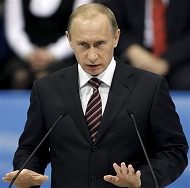voa标准英语2008年-Putin Says Russia Can Weather Global Economic C
搜索关注在线英语听力室公众号:tingroom,领取免费英语资料大礼包。
(单词翻译)
Russian Prime Minister Vladimir Putin says the global economic crisis tests the stability of all countries, including his own. Mr. Putin is expressing confidence that Russia has adequate financial resources but as VOA Moscow Correspondent Peter Fedynsky reports, Russia may now be spending money faster than it can save it. |
| Russian Prime Minister Vladimir Putin addresses the 10th United Russia Party Congress in Moscow, 20 Nov. 2008 |
Speaking as head of Russia's ruling United Russia Party, Prime Minister Putin laid out a long-term vision for his country to delegates at the party's annual congress in Moscow. He blamed the United States for jeopardizing1 his hopes for an expanded Russian middle class, increased life expectancy2, improved health care, adequate pensions, better housing, and lower levels of corruption3.
Mr. Putin says abuse of cheap credit and mortgage troubles in the United States created a chain reaction, which has paralyzed the global financial system and sown general distrust on markets.
Nonetheless, Mr. Putin told party members that Russia will avoid steep inflation and sharp declines in the value of its currency. He said the country will also maintain its reserves and budget stability regardless of falling global oil prices. Those reserves were accumulated through taxation4 of profits when the price of oil soared in recent years. Russia is a major oil exporter.
Mr. Putin says the reserves will allow Russia to maintain the salaries of civil servants, pension payments, and social benefits. He adds that the system of social support will continue to work normally.
Nikolai Petrov, a political analyst5 at the Moscow Carnegie Center, told VOA that Mr. Putin's plan assumes the global economic crisis will end soon.
Petrov says the situation in the country is reminiscent of a doctor who thinks about the mood of his patient and fears any radical6 measures, and instead of treating a serious disease, spends all of his efforts lifting the sick person's spirits.
Russia's national media report extensively on U.S. economic troubles, and do not dwell on negative domestic financial news, including a 70 percent drop in the Russian stock market since May. According to Bloomberg News, Russian currency reserves have fallen by nearly $123 billion since early August. On Wednesday, Russian Central Bank Chairman Sergei Ignatyev said the institution spent more than $57 billion in the last two months to support the declining market value of the ruble, which has dropped to its lowest level since April 2006.
With an estimated $475 billion in the reserve fund earlier in November, Nikolai Petrov notes that Russia can continue tapping its currency reserves at the present rate for about six months.
Russia's 2008 budget assumed revenues based on oil prices of $70 per barrel. Next year's budget was set for $95. The current price per barrel has fallen below $60.




